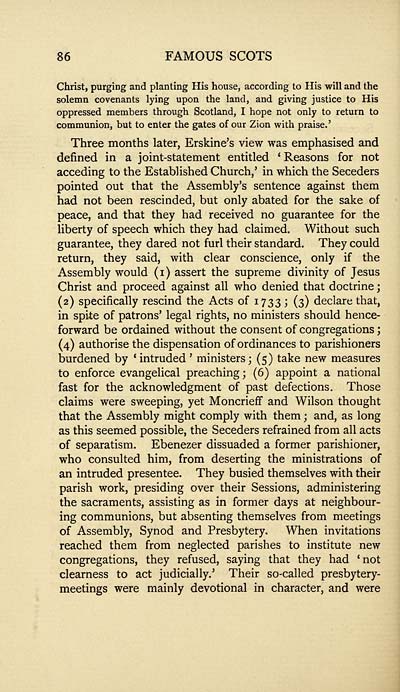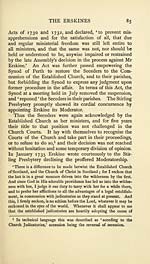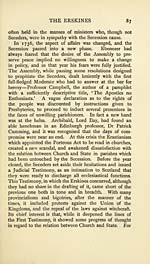Erskines
(90) Page 86
Download files
Complete book:
Individual page:
Thumbnail gallery: Grid view | List view

86 FAMOUS SCOTS
Christ, purging and planting His house, according to His will and the
solemn covenants lying upon the land, and giving justice to His
oppressed members through Scotland, I hope not only to return to
communion, but to enter the gates of our Zion with praise.'
Three months later, Erskine's view was emphasised and
defined in a joint-statement entitled ' Reasons for not
acceding to the Established Church,' in which the Seceders
pointed out that the Assembly's sentence against them
had not been rescinded, but only abated for the sake of
peace, and that they had received no guarantee for the
liberty of speech which they had claimed. Without such
guarantee, they dared not furl their standard. They could
return, they said, with clear conscience, only if the
Assembly would (i) assert the supreme divinity of Jesus
Christ and proceed against all who denied that doctrine ;
(2) specifically rescind the Acts of 1733 ; (3) declare that,
in spite of patrons' legal rights, no ministers should hence-
forward be ordained without the consent of congregations ;
(4) authorise the dispensation of ordinances to parishioners
burdened by ' intruded ' ministers ; (5) take new measures
to enforce evangelical preaching; (6) appoint a national
fast for the acknowledgment of past defections. Those
claims were sweeping, yet Moncrieff and Wilson thought
that the Assembly might comply with them ; and, as long
as this seemed possible, the Seceders refrained from all acts
of separatism. Ebenezer dissuaded a former parishioner,
who consulted him, from deserting the ministrations of
an intruded presentee. They busied themselves with their
parish work, presiding over their Sessions, administering
the sacraments, assisting as in former days at neighbour-
ing communions, but absenting themselves from meetings
of Assembly, Synod and Presbytery. When invitations
reached them from neglected parishes to institute new
congregations, they refused, saying that they had 'not
clearness to act judicially.' Their so-called presbytery-
meetings were mainly devotional in character, and were
Christ, purging and planting His house, according to His will and the
solemn covenants lying upon the land, and giving justice to His
oppressed members through Scotland, I hope not only to return to
communion, but to enter the gates of our Zion with praise.'
Three months later, Erskine's view was emphasised and
defined in a joint-statement entitled ' Reasons for not
acceding to the Established Church,' in which the Seceders
pointed out that the Assembly's sentence against them
had not been rescinded, but only abated for the sake of
peace, and that they had received no guarantee for the
liberty of speech which they had claimed. Without such
guarantee, they dared not furl their standard. They could
return, they said, with clear conscience, only if the
Assembly would (i) assert the supreme divinity of Jesus
Christ and proceed against all who denied that doctrine ;
(2) specifically rescind the Acts of 1733 ; (3) declare that,
in spite of patrons' legal rights, no ministers should hence-
forward be ordained without the consent of congregations ;
(4) authorise the dispensation of ordinances to parishioners
burdened by ' intruded ' ministers ; (5) take new measures
to enforce evangelical preaching; (6) appoint a national
fast for the acknowledgment of past defections. Those
claims were sweeping, yet Moncrieff and Wilson thought
that the Assembly might comply with them ; and, as long
as this seemed possible, the Seceders refrained from all acts
of separatism. Ebenezer dissuaded a former parishioner,
who consulted him, from deserting the ministrations of
an intruded presentee. They busied themselves with their
parish work, presiding over their Sessions, administering
the sacraments, assisting as in former days at neighbour-
ing communions, but absenting themselves from meetings
of Assembly, Synod and Presbytery. When invitations
reached them from neglected parishes to institute new
congregations, they refused, saying that they had 'not
clearness to act judicially.' Their so-called presbytery-
meetings were mainly devotional in character, and were
Set display mode to:
![]() Universal Viewer |
Universal Viewer | ![]() Mirador |
Large image | Transcription
Mirador |
Large image | Transcription
Images and transcriptions on this page, including medium image downloads, may be used under the Creative Commons Attribution 4.0 International Licence unless otherwise stated. ![]()
| Histories of Scottish families > Erskines > (90) Page 86 |
|---|
| Permanent URL | https://digital.nls.uk/95188158 |
|---|
| Description | A selection of almost 400 printed items relating to the history of Scottish families, mostly dating from the 19th and early 20th centuries. Includes memoirs, genealogies and clan histories, with a few produced by emigrant families. The earliest family history goes back to AD 916. |
|---|

